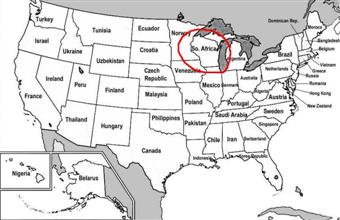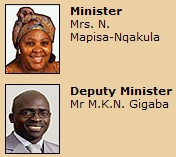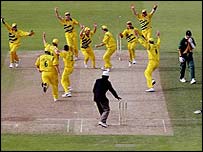You’re the man!

Category Archives: south africa
1 ATM bombing per day in SA
In South Africa criminals have taken to blowing up ATM’s in order to make off with the cash in them. This Financial Mail article discusses the trend:
In the first five months of this year, 148 ATM blasts were carried out across SA – an average of one a day, and nearly three times the number in all of 2006.
Security analysts are growing increasingly concerned at the ease with which the bombers are able to obtain the mining explosives used in most bombings.
Another article on the South African economy
The Economist has another article on the South African economy. Although they say things are going well right now, not everything is looking up in the long run.
- Growth has outpaced infrastructural development:
The country’s infrastructure is creaking—roads are overcrowded, cement and refined fuels are having to be imported, and power outages are a growing problem
- They are also concerned about the current-account deficit:
At present the deficit is being funded comparatively easily, but an emerging-markets sell-off—which many analysts believe to be inevitable over the next year—would hit South Africa hard, putting first the rand and then domestic interest rates under pressure.
- The skills deficit is also mentioned as a serious (and worsening) problem. This is especially true in the public sector at all levels.
According to the country’s largest bank, ABSA, managers are battling to cope with “severe shortages of skilled labour and production capacity constraints”
Several factors are mentioned as contributing to the skills shortage but emigration is specifically talked about.
The South African Institute of Race Relations estimates that some 850,000 whites have left the country since 1995, reducing the white population (which, for historical reasons, is still the most skilled segment) to around 4.3m people from more than 5m a decade ago. ABSA believes that “the vast majority” of those who have left the country—or are contemplating doing so—are skilled people between the ages of 20 and 40. This white exodus is being compounded, according to the bank, by the increasing emigration of mixed-race, Asian and black professionals, especially from the public sector, which is losing medical, technical and engineering skills very rapidly.
South Africa has a GDP roughly the same as Wisconsin
This article has a cool map on which they have renamed the American states to countries which have similar GDP’s. South Africa apparently has a similar GDP to the state of Wisconsin…
Check out the full article, it’s pretty interesting and comes from a cool site called “strange maps”

Related article: World map warped by GDP values
Don’t blame the strikers, blame the system
This is a predictable situation for a group of self interested parties. The government wants to save money, the workers want more money, and the trade unionists want to push their own careers. Makes sense and you can’t really blame any of the parties involved (although I despise those who prevent others from working – especially in essential services).
The public – including me – also have a stake in this argument. We need those government workers to deliver services to us – something they they are not always very good at. I heard a guy on the radio speaking about this – he reckons that the solution is for the state to ‘outsource’ as many of its functions as possible. For instance, the state pays for the roads but doesn’t actually build them itself. Similarly the state should pay for prisons, but there is no reason for the state to actually run the prisons.
The idea is that competition in any arena would:
- Increase efficient delivery (something that we really have a problem with);
- Increase competition for good employees, thus driving wages up.
I am a fan of this kind of thinking in general. Systems should be flexible, goals should be set, and competition should allow the best solutions to float to the top. The government could set the goals and pay the best people to meet those goals. Government’s role should be to select goals and to allocate financial resources to those goals, but competing companies should be doing the work.
This would also help to avoid a situation where hundreds of thousands of people are striking. Wages would be more flexible and reactive, and agreements could be negotiated for specific situations. We certainly wouldn’t land up in the situation we are now in.
The unionists would argue that this would put too much power into the hands of the capitalist business owners. I don’t agree.
South Africa’s department of home affairs – a picture of inefficiency
 I was recently speaking to a highly educated German woman who has been trying to get a work permit in South Africa. She told me that after 18 months of trying she was recently told that she could have to wait up to 8 years before her request is granted. Apparently this is due to the shambles at home affairs – they are just too far behind.
I was recently speaking to a highly educated German woman who has been trying to get a work permit in South Africa. She told me that after 18 months of trying she was recently told that she could have to wait up to 8 years before her request is granted. Apparently this is due to the shambles at home affairs – they are just too far behind.
I wonder what economic impact this kind of inefficiency in government has. I remember a while back, a South African man became so frustrated with home affairs that he took a hostage in order to get his Identity Document!
Article on the state of South Africa’s road networks
There is an interesting article on the South African road network in the Financial Mail of June 1. Here are some highlights:
- It is estimated that 40% of the critical road network will reach the end of it’s structural life in the next 5 years
- The amounts budgeted for roads are increasing hugely (R2.1bn in 2005/6 to R11.5bn in 2009/10)
- More and more of this money is going to toll roads – more and more national roads will be toll roads
- Because all of the expenditure is coming at once instead of steadily over time, there are severe shortages
- This is expected to lead to a cost escalation of about 30-50%
- Regulatory approval is also proving an issue with some roads waiting up to 4 years for approval
All of this paints quite a scary picture. Then there is the fact that Spoornet is also not keeping pace (for instance road now carries 82% of freight between Johannesburg and Durban instead of the other way around).
Thank heavens the guys are putting money and effort into it now (there really are road works everywhere), I just wish they hadn’t left it so late. And while they are at it, put money into the power grid too…
That said, I know that we are not alone. Whenever I go to New York I am shocked by the state of some of their roads.
Lightning in Cape Town
Battle at Kruger – Lions, Crocs and Buffalo do battle
I recently came across this incredible video on YouTube. If you have the bandwidth I highly recommend watching it – all 8 minutes are well worth it. It’s an incredible running battle between a pride of lions, a herd of buffalo and a couple of crocs.
My reactions to Cricket World Cup tragedies over the years
Last night South Africa crashed out of yet another Cricket World Cup. In the past I devastated by these world cup exits, but I wasn’t nearly as upset as usual this time around. I think that this was partially due to the fact that it wasn’t a close match, and that we had played badly throughout.
However, I also like to think that my reactions to these tragedies show that I have been maturing.
 When I was 16 in 1999 when we got bumped out of the competition by an ascendant Australia in that match. I still hurt thinking about what could have been if we had won that match.
When I was 16 in 1999 when we got bumped out of the competition by an ascendant Australia in that match. I still hurt thinking about what could have been if we had won that match.
Reaction – I collapsed onto my couch and cried – and I was upset for months (if not years)
 Then in 2003 we screwed up the rain charts and crashed out in needless fashion – another close one and this time at home. This time I was 20, at university and living in digs.
Then in 2003 we screwed up the rain charts and crashed out in needless fashion – another close one and this time at home. This time I was 20, at university and living in digs.
Reaction – I went out and drowned out my sorrows in a big way.
 Now in 2007 we were hammered by a truly awesome Australian outfit. Out team had played badly all tournament and we were well and truly pummelled.
Now in 2007 we were hammered by a truly awesome Australian outfit. Out team had played badly all tournament and we were well and truly pummelled.
Reaction – I said “Oh, well” carried on with my work, went for a run and then had a lovely dinner with Julie.
The maturing Alistair illustrated through the metranomic tragedies of South Africa at the Cricket World Cup.
